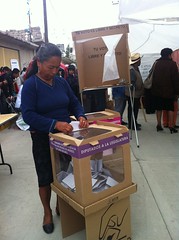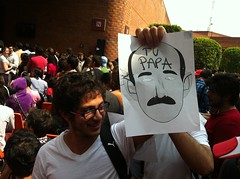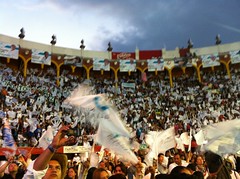By David Agren
Catholic News Service
SAN CRISTOBAL DE LAS CASAS, Mexico (CNS) -- The National Zapatista Liberation Army once captured the public imagination with a New Year's Day uprising in the this southern Mexican state to coincide with the 1994 implementation of the North American Free Trade Agreement.
Then-university student Gubidcha Matus recalled the enthusiasm as young people loaded up caravans with food and provisions and headed for Zapatista communities.
But that was 19 years ago, and past sympathizers like Matus say Mexico has moved on from the 1990s as a new generation has grown up with free trade, an imperfect democracy and few memories of one-party rule -- even if injustice and inequality persists, especially in indigenous communities.
"Many in my generation participated" in protests and caravans, said Matus, director of communications at the Catholic-founded Fray Bartolome Human Rights Center in Chiapas. "Many (young people) of today only were born at the time this happened."
The Zapatistas reappeared Dec. 21 -- the day the Mayan calendar turned over and a date erroneously interpreted as the end of the world -- when an estimated 40,000 masked members silently marched in five municipalities.
The reappearance punctured a long period of quiet for the Zapatistas, although Matus said jokingly that many outsiders interpret silence from their pipe-smoking leader, Subcommandante Marcos, as the Zapatista movement disappearing or going into decline.
Matus and other observers say the mobilization caught many off-guard but provoked no panic. They attribute the marches to symbolism, special dates on the calendar and routine political events, along with making a statement -- not any sort of indigenous uprising.
"Did you hear?" asked a Dec. 21 statement signed by Subcommandante Marcos. "It's the sound of your world crashing down. It's of our resurgence."
The statement also made light of new governments on the federal and state levels, ruled by the Institutional Revolutionary Party and its smaller ally, the Green Party.
The Zapatistas have a sour history with the Institutional Revolutionary Party, or PRI, which governed Mexico for 71 straight years, until 2000, and retook power Dec. 1.
The group accuses previous party governments of not respecting a 1996 agreement to provide indigenous peoples with more rights, autonomy and self-governance. The agreement was negotiated with the help of then-Bishop Samuel Ruiz Garcia of San Cristobal de Las Casas, a champion of indigenous peoples but an opponent of armed actions.
The Zapatistas also have found fault with the failure to prevent paramilitaries from massacring 45 displaced people from a Catholic pacifist group known as Las Abejas (The Bees) during a December 1997 prayer meeting.
"There's been no progress" in Chiapas, said Bishop Raul Vera Lopez of Saltillo, who was a coadjutor bishop in the area at the time.
Why the Zapatistas marched on a misty December morning remains open to interpretation.
Local anthropologist Gaspar Morquecho says Subcommandante Marcos launched a nationwide tour in 2006, which captured little attention or support and resulted in the Zapatistas retreating to their municipalities, where they focused on their schools, clinics and productive activities such as artisan works and producing coffee. He suspects Marcos might want to make another attempt at fomenting a nationwide movement.
The federal government has responded indirectly to the re-emergence.
On Jan. 21, President Enrique Pena Nieto visited an indigenous community in Chiapas -- in the heart of Zapatista territory -- to announce a "crusade" against hunger, which is expected to be the social policy focus of his six-year administration.
He directed his message to the population at large, but the scene of the mid-January announcement suggested someone specific: the Zapatistas.
"What the federal government did was take a politically opportunistic measure by coming to a (Zapatista) community to launch a crusade against hunger," said Jesuit Father Pedro Arriaga, spokesman for the Diocese of San Cristobal de Las Casas.
He found it ironic, too. The government, Father Arriaga said, has launch previous anti-hunger programs and the Zapatistas "have always resisted all the government's projects."
Marcos said the problems the president aims to resolve are not pressing in the Zapatistas' autonomous communities.
"Our children go to schools that teach them their own history ... as well as sciences ... necessary for them to grow without ceasing to be indigenous," said a Dec. 30 statement from Marcos, who is not indigenous and has been identified by the Mexican government as Rafael Sebastian Guillen Vicente.
"The indigenous members of PRI attend our hospitals, clinics and laboratories because in those of the government, there is no medicine, medical devices or doctors," he said.
Father Arriaga said the Zapatistas were getting by OK and had some successes.
"They're not living in abundance, but they're not going hungry," said Father Arriaga, pastor of the St. John the Baptist Parish in the indigenous community of San Juan Chamula.
"The most important thing that I take away is that they've eradicated alcoholism," he added. "It's one of the ills in indigenous communities, but the Zapatistas ... they don't drink or sell alcohol in their communities. This really helps their own cause."
How far that cause spreads remains to be seen. Morchequo sees a "conservative" Mexican population, which has been preoccupied with other matters such as security, and a more complex political landscape for the Zapatistas to confront.
Still, he noted of the most recent mobilization, "No one thought they could move 40,000 people."






